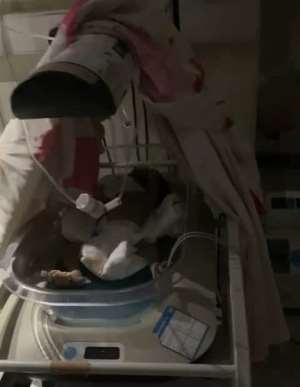
The Tema General Hospital's Neonatal Intensive Care Unit (NICU) has been struggling to provide care for the babies due to frequent power outages and the unavailability of alternative sources of electricity to ensure uninterrupted service delivery.
The NICU provides specialised care for pre-term babies and others with complications such as breathing problems, infections, and birth defects, who are mostly put on oxygen, incubators, and other machines.
A video that went viral, supposed to have been taken at the NICU on Tuesday evening, showed several babies receiving care at the Unit, which had been plunged into darkness, and the medical equipment supporting them had gone off following a power outage occurring between 2000 and 0043 hours.
Some of the mothers, confirming the incident to the Ghana News Agency on Wednesday, said even though parts of the hospital were powered by generators, the NICU, where their babies were receiving critical care, had no power for hours.
They expressed worry over the possibility of losing their babies if the situation continued unresolved.
The mothers, therefore, called on the Electricity Company of Ghana to spare the hospital the frequent cuts in power, while appealing to stakeholders to assist with generators with the right capacity and other resources to provide alternative power to the Unit to make it function effectively.
Apostle Dr Samuel Obeng-Mensah, the Administrator of Support Services at Tema General Hospital, told the media that management could not confirm if the viral video was taken at the hospital's NICU because all other hospitals had the same setup.
He added that they were yet to interrogate the video before they could speak to it, in addition to getting all the information needed from the Unit.
He, however, confirmed that the hospital experienced a power outage on Tuesday night, but whenever they experienced such outages, the hospital mitigated them with its generators that automatically switched on.
Dr Obeng-Mensah said the hospital had about five generator sets, which were scattered at the facility, however, the biggest capacity generator of 160 kV of the facility powered the NICU, Pediatric Emergency, Maternity, and Adult Emergency.
“These are essential departments, while the others also automatically power the other units the moment the power goes off,” he said.
The hospital needed a bigger generator of about 450 kV to boost its generation, he said and called on companies and philanthropists to help management acquire one.
GNA




 Don't travel to volatile regions in northern Mali — Ministry of Foreign Affair t...
Don't travel to volatile regions in northern Mali — Ministry of Foreign Affair t...
 ILO’s claim of depleting reserves false, we have funds to pay pensions — SSNIT
ILO’s claim of depleting reserves false, we have funds to pay pensions — SSNIT
 Benin police fire tear gas to break up union protest
Benin police fire tear gas to break up union protest
 Lay KPMG audit report on SML-GRA contract before Parliament – Isaac Adongo tells...
Lay KPMG audit report on SML-GRA contract before Parliament – Isaac Adongo tells...
 Supervisor remanded for stabbing businessman with broken bottle and screwdriver
Supervisor remanded for stabbing businessman with broken bottle and screwdriver
 People no longer place value in public basic schools; new uniforms, painting wil...
People no longer place value in public basic schools; new uniforms, painting wil...
 'Comedian' Paul Adom Otchere needs help – Sulemana Braimah
'Comedian' Paul Adom Otchere needs help – Sulemana Braimah
 Ejisu by-election: Only 33% of voters can be swayed by inducement — Global InfoA...
Ejisu by-election: Only 33% of voters can be swayed by inducement — Global InfoA...
 Minority will expose the beneficial owners of SML, recover funds paid to company...
Minority will expose the beneficial owners of SML, recover funds paid to company...
 Prof. Opoku-Agyemang has ‘decapitated’ the NPP’s strategies; don’t take them ser...
Prof. Opoku-Agyemang has ‘decapitated’ the NPP’s strategies; don’t take them ser...
